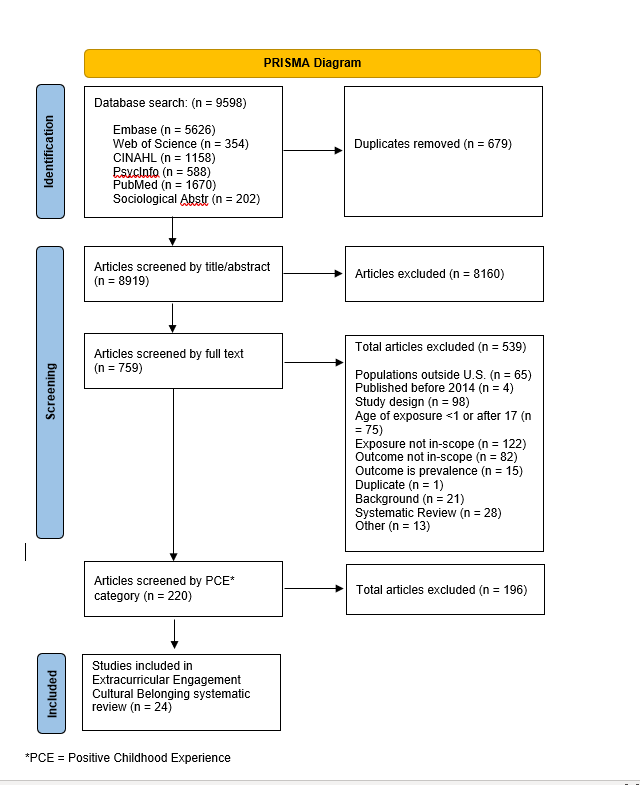Public Health & Prevention
Session: Public Health & Prevention 3
237 - Social Engagement and Health Outcomes: A Systematic Review of the Literature
Saturday, May 4, 2024
3:30 PM - 6:00 PM ET
Poster Number: 237
Publication Number: 237.1626
Publication Number: 237.1626

Dina Burstein, MD, MPH (she/her/hers)
Assistant Professor
Tufts University School of Medicine
Boston, Rhode Island, United States
Presenting Author(s)
Background: Evidence has emerged linking positive childhood experiences (PCEs) to improved health outcomes. The HOPE (Healthy Outcomes from Positive Experiences) framework describes four broad categories of PCEs essential for optimal development and health outcomes, including Relationships, Environment, Engagement and Emotional Growth.
Objective: Conduct a systematic review of the literature examining the effects of extracurricular engagement and the child’s sense of community or cultural belonging on health outcomes.
Design/Methods: We followed the Preferred Reporting Items for Systematic Reviews and Meta-Analyses (PRISMA) guidelines when performing this systematic review. Manuscripts were drawn from the results of a previous scoping review of the literature performed by the research team. We assessed study quality using the National Institutes of Health’s (NIH) Study Quality Assessment Tool for Observational Cohort and Cross-Sectional Studies.
Results: The prior scoping review identified 24 studies examining extracurricular engagement or community/cultural belonging as the exposure. Fifteen studies examined connections between the opportunity for extracurricular engagement and selected health outcomes. Of these, 12 studies were deemed to be good quality and three of fair quality. Four studies examined the association between extracurricular involvement and substance use identifying five beneficial associations, one non-beneficial and one non-association. Eleven studies tested 19 associations between extracurricular engagement and mental health outcomes, finding 12 beneficial associations and seven non-associations.
Nine studies examined connections between a sense of community or cultural belonging and outcomes. Five were determined be good quality, three fair quality, and one poor quality. Eight of these nine studies looked at the relationship between community or cultural belonging and substance use, finding 11 beneficial associations, eight non-associations, and one harmful association. Two studies examined outcomes of depression and anxiety, finding one beneficial association and one non-association for depression and two non-associations for anxiety.
Conclusion(s): There is a high level of evidence supporting a beneficial association between extracurricular engagement and mental health outcomes. There is a moderate level of evidence supporting a beneficial association between cultural/community belonging and mental health and substance use outcomes. There is a lack of research examining associations between childhood engagement and physical health outcomes.

